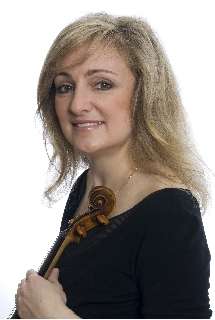|
Back
Another stimulating evening from Esprit Toronto
Koerner Hall
05/15/2011 -
Alex Pauk: Portals of Intent
Sofia Gubaidulina: Offertorium
Nick Storring: remember how we used to...?
Denis Gougeon: Phénix
Chris Paul Harmon: Coyote Soul
Marie Bérard (Violin)
The Esprit Orchestra, Alex Pauk (Conductor)

M. Bérard(Courtesy of the Esprit Orchestra)
The Esprit Orchestra’s final concert of the season gave us yet another varied and intriguing array of contemporary pieces, including a world premiere. Added bonus: four of the five composers were present.
Alex Pauk founded the orchestra in 1983 and his success in presenting, commissioning and conducting new works has tended to overshadow the fact that he is also a composer. Portals of Intent, inspired by the writings of Carlos Castaneda, was composed in 1994. The title refers to states of heightened awareness. The work is about 16 minutes in length and its single movement has five sections: Shades of Realization, Silent Knowledge, The Dreamer, Assemblage Points of Luminosity, and The Gait of Power. The composer’s notes refer to complex sonorities, and it certainly has those, leaving a kind of maximalist impression overall, before it melts away at the end.
The big piece on the program was Sofia Gubaidulina’s Offertorium for violin and orchestra, a work that seems to have achieved the status of a modern classic thanks to its dedicatee, Gidon Kremer, who has toured it widely since he premiered it in 1980. We can now add another fine violinist to its list of champions, Marie Bérard, who teaches at the Royal Conservatory and is also concertmaster of the Canadian Opera Company’s crack orchestra.
The work begins with what is known as the royal theme from J.S. Bach’s Musical Offering then quickly moves along toward increasingly complex and fragmented variations on the theme. The concept of intent had been introduced by Alex Pauk’s work and I was struck by the sense of intent contained in both the composition and the soloists’s performance. The work has moments of extreme intensity amid lengthy attenuated passages where the composer follows the example of Anton Webern (who, incidentally, also composed a work from the Musical Offering) when she has the theme played by a different instrument for each note. The technique is called pointillism or Klangfarbenmelodie (it sounds more impressive in German, doesn’t it? - it means “tone colour melody”). Here is a work that takes the listener on a complex, somewhat puzzling (but not off-putting) sonic journey - and it helps that it was performed by this dedicated orchestra in the ideal hall.
Following the intermission (which turned out to be a patron appreciation reception - very nice), the Executive Director of the Canadian Music Centre, Elisabeth Bihl, presented Nick Storring with the Emerging Toronto Composer Award ($5000). Thirty members of the orchestra’s string section then played his remember how we used to...? which turned out to be a subtly emotive work (just five or six minutes long) with a delicate wash of sound that conjures up the love ballads of the era of Gershwin or Sinatra. A kind of nostalgic dream piece. The award, by the way, was not for the piece but for his innovative, risk-taking approach to composing. Let’s hear more from him.
Quite a change in tone came with Phénix by the well-established Montreal composer Denis Gougeon. Composed in 1988, it seeks to conjure up the phoenix, the mythical bird with the power to be reborn from its own ashes. As the composer states, he started with a simple A Minor chord from which he built an impressive musical structure. The piece has a recognizable (and grand) arc in contrast to the more discursive pieces on the program.
Finally, the world premiere: Coyote Soul by Chris Paul Harman, a Toronto-born composer now teaching at McGill University in Montreal. The composer’s program note consisted of just eight words, arranged as follows:
Birds Stars Sky Angels
Appear Fall Create
Suddenly
This would seem to indicate that the 20-minute work is in eight sections, but I counted (I think) 10 pauses, thus perhaps 11 sections. The piece begins with piano, flutes and gongs (creating a Japanese-influenced sound), then horns enter and it becomes more reminiscent of Messaien (Turangalila perhaps). Things become increasingly atomized, but then the final section has a sparkly, whimsical arrangement os a well-known tune, Burt Bacharach’s Close to You (leading to a sudden - and ambiguous - ending). I suspect personal references here: Burt Bacharach attended McGill’s music school, and Close to You was a hit song in 1970, the year Mr Harmon was born. (This is just a guess - the only program notes were the eight words quoted above.)
My description might make Coyote Soul seem a trifle, but it is not: Mr Harmon is quite the whiz at orchestration and the work is throughly engaging.
Also on this occasion Esprit released details of its 2011-12 season. Chris Paul Harmon will have another work performed, among works by John Corigliano, Valentin Sylvestrov, Arvo Pärt, Ann Sokolovic, Iannis Xenakis, György Ligeti, Harry Somers, Alfred Schnittke, and others. All concerts at Koerner Hall where they belong.
Michael Johnson
|